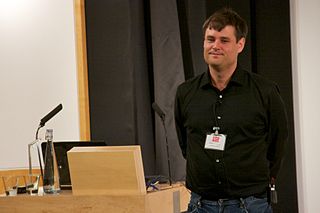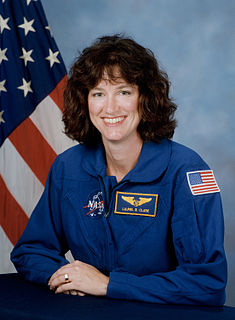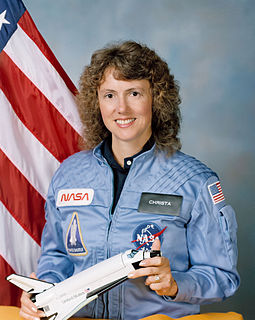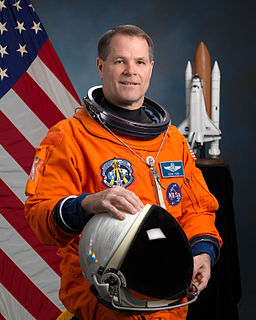Top 1200 Space Science Quotes & Sayings
Explore popular Space Science quotes.
Last updated on April 14, 2025.
We have to overthrow the idea that it's a diversion from 'real' work when scientists conduct high-quality research in the open. Publicly funded science should be open science. Improving the way that science is done means speeding us along in curing cancer, solving the problem of climate change and launching humanity permanently into space.
We've been surrounded by images of space our whole lives, from the speculative images of science fiction to the inspirational visions of artists to the increasingly beautiful pictures made possible by complex technologies. But whilst we have an overwhelmingly vivid visual understanding of space, we have no sense of what space sounds like.
In 2009 I went up on the space shuttle. I was in space for 16 days and docked at the space station for 11 days. The entire crew did five space walks, of which I was involved with three of them. When you're doing a space walk, you always have a buddy with you. It's a very dangerous environment when you're doing a space walk.
Bohr’s standpoint, that a space-time description is impossible, I reject a limine. Physics does not consist only of atomic research, science does not consist only of physics, and life does not consist only of science. The aim of atomic research is to fit our empirical knowledge concerning it into our other thinking. All of this other thinking, so far as it concerns the outer world, is active in space and time. If it cannot be fitted into space and time, then it fails in its whole aim and one does not know what purpose it really serves.
But as Van casually directed the searchlight of backthought into that maze of the past where the mirror-lined narrow paths not only took different turns, but used different levels (as a mule-drawn cart passes under the arch of a viaduct along which a motor skims by), he found himself tackling, in still vague and idle fashion, the science that was to obsess his mature years - problems of space and time, space versus time, time-twisted space, space as time, time as space - and space breaking away from time, in the final tragic triumph of human cogitation: I am because I die.
If an artist is reaching for the universe as a source of creative muse, then I'm there. I'm gonna say, "Yeah. Here's Saturn. Here's a black hole. Here's twisted space-time. Talk to me. What do you need? What do you want?" And I'll just feed you, because I think only then does science become mainstream - when science becomes a legitimate topic for artists.
Literary science fiction is a very, very narrow band of the publishing business. I love science fiction in more of a pop-culture sense. And by the way, the line between science fiction and reality has blurred a lot in my life doing deep ocean expeditions and working on actual space projects and so on. So I tend to be more fascinated by the reality of the science-fiction world in which we live.
I believe that space travel will one day become as common as airline travel is today. I'm convinced, however, that the true future of space travel does not lie with government agencies -- NASA is still obsessed with the idea that the primary purpose of the space program is science -- but real progress will come from private companies competing to provide the ultimate adventure ride, and NASA will receive the trickle-down benefits.
New Rule: Since our new national position on science is, "Screw it, we prefer witchcraft," let's not just retire the Space Shuttle Atlantis. Let's drive it to one of the five stupidest States and have the locals beat it with sticks. Putting it in a museum is too dangerous. Someone could steal it, fly it into space and notice we revolve around the sun.
The ability of the humans to not only function in space but be very functional when they arrive at their destination, those are the kinds of things we're learning from the science. Fuel transfer technologies and all the things we can learn about the space environment are all valuable to us for pressing on out.
The apologists for space science always seem over-impressed by engineering trivia and make far too much of non-stick frying pans and perfect ball-bearings. To my mind, the outstanding spin-off from space research is not new technology. The real bonus has been that for the first time in human history we have had a chance to look at the Earth from space, and the information gained from seeing from the outside our azure-green planet in all its global beauty has given rise to a whole new set of questions and answers.
For me space rock is something that takes you out of yourself and out of your normal realm. And if space happens to be that inner space or outer space it's a very personal thing. I think that mantra is space music. I think that Native American tribal drumming is space music. Anything that allows you to go inward to go outward and to move within a space that is not normal to your reality.
While, on the one hand, the end of scientific investigation is the discovery of laws, on the other, science will have reached its highest goal when it shall have reduced ultimate laws to one or two, the necessity of which lies outside the sphere of our cognition. These ultimate laws-in the domain of physical science at least-will be the dynamical laws of the relations of matter to number, space, and time. The ultimate data will be number, matter, space, and time themselves. When these relations shall be known, all physical phenomena will be a branch of pure mathematics.
Sci-fi uses the images that sf - starting with H.G. Wells - made familiar: space travel, aliens, galactic wars and federations, time machines, et cetera, taking them literally, not caring if they are possible or even plausible. It has no interest in or relation to real science or technology. It's fantasy in space suits. Spectacle. Wizards with lasers. Kids with ray guns. I've written both, but I have to say I respect science fiction enough that I wince when people call it sci-fi.
I think I set myself on a course to become a scientist around about the time that Carl Sagan's 'Cosmos' series was on television, and there really was no going back for me at that point, and then I went on to study space science and then get my Ph.D., then go aboard and work in the European Space Agency.
I'm always involved with the Aerospace Program and NASA and Goddard Space Flight Center. And if kids feel so inclined, they can log onto NASA and the Optimus Prime Spinoff Award, which we present every year to some of the brilliant young minds that are taking up into the academics of space, science, technology, math.
The partisanship surrounding space exploration and the retrenching of U.S. space policy are part of a more general trend: the decline of science in the United States. As its interest in science wanes, the country loses ground to the rest of the industrialized world in every measure of technological proficiency.
From space travel to organ transplants, one of the most important influences shaping the modern world is science. Amazingly, people who lived during the Civil War had more in common with Abraham than with us. If Christians are going to speak to that world and interact with it responsibly, they must interact with science.
We were trying to do as much science as we could because that was the main purpose of the international space station. But without the shuttle to bring up heavy laboratory equipment and bring back samples, we were limited by what we could do, but I was proud that we actually accomplished more science that was planned for the flight. And I got a chance to do two Russian spacewalks on that flight, I had become an expert in U.S. spacewalks and using U.S. suits and techniques, and this was a chance to put on a Russian Orlan suit and do two construction space flights outside of the space station.





















































